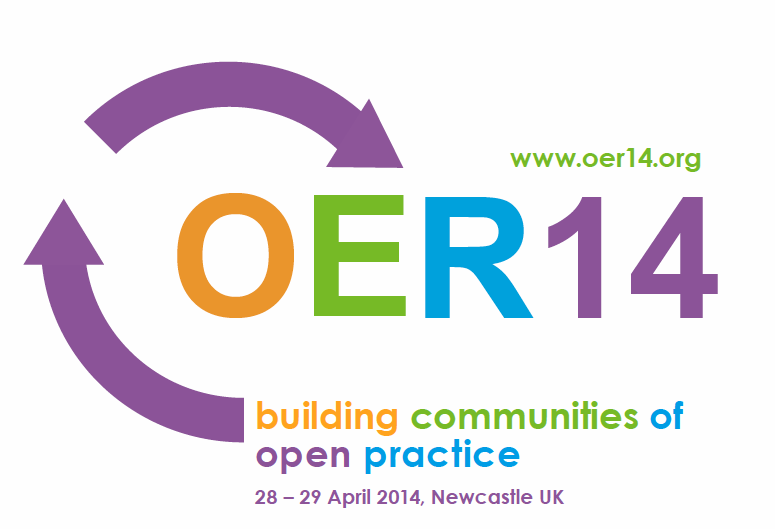DIAL at OER14 Conference paper - Developing Practice Based Massive Open Online Communities of Interest
OER14: building communities of open practice The Centre for Life, Newcastle, 28-29 April 2014 (in collaboration with OCWC, Slovenia, 23-25 April 2014)
 The conference themes below are focussed on OER as a collaborative catalyst for building communities of open practice.
The conference themes below are focussed on OER as a collaborative catalyst for building communities of open practice.
- Building and linking communities of open practice
- MOOCs and open courses
- Academic practice, development and pedagogy
- Open policy, research, scholarship and access
- Students as users and co-creators
DIAL & artsmooc OER14 Conference paper- Developing Practice Based Massive Open Online Communities of Interest
Introduction:
This presentation aims to explore and question the challenges, motivations and benefits of staff and students participating in open online learning communities, as a casual observer and/or as an active contributor. What are our motivations for being part of an online community of interest, as a learner, a teacher or as a digital steward?
Methods:
Chris Follows will draw from his past seven years experience of working with online open educational practice and digital literacies projects and activities including: the ongoing agile development of process.arts.ac.uk and the JISC/UAL developing Digital literacies project, Digital Integration into Arts Learning (DIAL) project.
Results:
Chris will summarise a broad selection of the key findings, issues and lessons learned from across DIAL and process.arts including:
• Stewarding the digital stewards; managing and curating multiple online communities of interest
• Supporting online communities; the DIAL communities of practice approach to developing digital literacies
• Collaboration: Departmental collaboration and local strategy change
• Fear of digital (institutional and individual): skills, competencies, awareness damage to traditional practice and repetitional risk
Discussion:
Chris will explore how these findings relate to the wider current technological and pedagogical challenges facing the arts HE sector today, including sector engagement and use of online technology for enhancing learning and teaching practice, including MOOCs. How will the arts sector move forward and face the challenges of digital and openness?
Chris will discuss how we can develop a new approach to integrating digital in arts learning, one which supports the ‘non-digital‘ creative, those innovators that have the vital physical/practical skills and knowledge. And the techno creative innovators, those who have the hard and soft digital and web making literacies skills. With this approach we have have innovators in both camps, supporting and working together.
Chris will introduce a new initiative, which aims to pilot this approach. The artsmooc project will build on the progress and innovations of the past ten years in open educational practice and in the original principles of ‘cMOOCs’, based on connectivism, and its four principles – autonomy, diversity, connectedness and openness.
Arts Massive Open Online Course: artsmooc - http://www.artsmooc.org aims to provide a unique specialist Arts MOOC support network for those in the creative industries who are considering enhancing and complimenting their current face-to-face offer with ‘Massive Open Online Courses’ or virtual learning communities, working together across the sector to create new, dynamic and unique collaborative artsmoocs.
The project aims to attract independent innovation partners from across the sector, including individuals and collectives from education & Industry, to help build a strong ‘hands on’ research and development network of specialist practitioners, exploring together the development and integration of ‘practice’ based Arts Massive Open Online Courses or MOOCs.
The venture aims to explore the collaborative potential of building communities of interest and course pathways around virtual and physical arts resources by utilising various existing support networks and initiatives.
By partnering with existing arts support networks and initiatives together with new technological innovation artsmooc aims to collectively create an independent and inclusive hybrid open physical and virtual arts learning environment. A new dynamic and diverse arts community, with a strong emphasis back on openness and collaboration.
References:
Lave, Jean & Wenger, Etienne. 1991. Situated Learning: Legitimate peripheral participation. New York: Cambridge University Press
Milligan. C, Littlejohn. A, Margaryan. A - Patterns of Engagement in Connectivist MOOCs, Available at http://jolt.merlot.org/vol9no2/milligan_0613.htm [Accessed on 26/10/2013]
Wenger, E. 1998. Communities of Practice Learning, meaning and Identity. New Yotk: Cambridge University Press
Wenger, E. White, N. and Smith, J.D., 2009. Digital Habitats; Stewarding Technology for Communities. Portland: Cpsquare.
White. D, Le Cornu. A, Oxford, visitors and residents Available at http://tallblog.conted.ox.ac.uk/index.php/2009/10/14/visitors-residents-the-video/ [accessed April 2012]

This Work, DIAL at OER14 Conference paper - Developing Practice Based Massive Open Online Communities of Interest, by cfollows is licensed under a Creative Commons Attribution-ShareAlike 4.0 International license.

